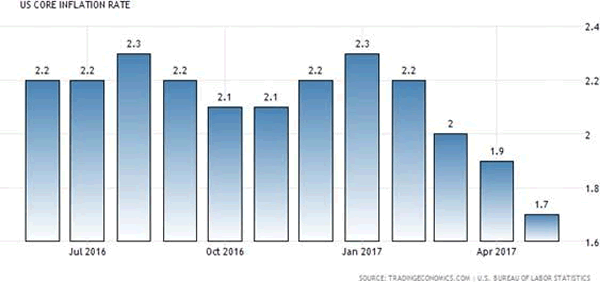Key Points:
- Fed Chair Yellen takes a dovish tone before congress.
- Central bank likely to rely mainly upon QE taper rather than multiple rate hikes.
- Equity and bond markets likely to be strongly impacted by any QE taper.
The markets have been relatively consigned to the fact of a cycle of interest rate tightening from the U.S. Federal Reserve in the coming year given the historic expectation setting that has occurred of late. However, the venerable Fed Chair, Janet Yellen, has tendered some testimony to congress which appears to take a significantly more dovish tone and has caused sentiment to swing sharply away from the greenback. Subsequently, markets have been left wondering just which direction the central bank will head in the coming months.
However, it wasn’t really a surprise that there are many within the FOMC that are now backing away from an ever delayed cycle of significant tightening. The central bank’s main problem is the abject lack of price inflation within the U.S. economy despite a strengthening labour market. Subsequently, given that inflation is running at around 1.4% (if you believe the official measure), it isn’t a surprise that Yellen’s comments indicate that the Fed is near to a neutral interest rate. Presently, the FFR sits at around 0.75% with a target rate of between 1.00% and 1.25%. So the central bank’s contention is that an additional hike would take interest rates to a neutral level for the economy.

However, the real reason that the Fed is moving away from the rhetoric of a multiple rate hike tightening cycle is their balance sheet. The central bank has signalled their intention to start a balance sheet taper sometime in 2017 and this is likely to have a relatively strong impact on equity and bond markets. The current view is that the Fed will be looking to gradually offload around $4.5 trillion in bonds from their balance sheet and this is likely to have the same impact as further tightening in interest rates. Subsequently, equity markets could be in for a fairly rough ride once the QE removal process starts and some fairly rapid capital flows occur.
Additionally, if there are any further ripples in the global economy the Fed also faces the prospect of little in the way of macroeconomic tools to respond to recessionary pressures. Interest rates have a limited distance from the zero lower bound and the Fed is likely to still be carrying significant amounts on their balance sheet as any taper will likely not be rapid.
Regardless, the central bank has a job to do and they might have finally realised that the low inflation recovery has largely hampered their ability to respond to any form of crisis and, as such, are now looking at ways to normalise within relying upon strong rate hike cycles. Subsequently, we are left with the view that the Fed will likely hike 25bps in the remaining part of 2017 whilst slowly unwinding some of the bonds on their balance sheet. Ultimately, this means we are not likely to see the rampantly bullish U.S. Dollar that was largely expected with the planned multiple hikes.
